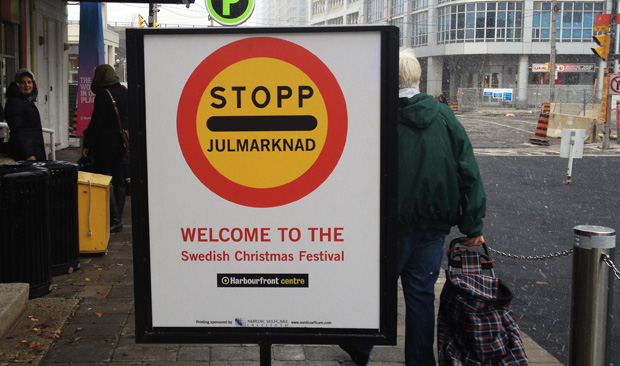


In a big room with wooden floors at the Toronto Harbourfront Centre, people are waiting in line to get their chance to pick up some real Swedish food. Over someone’s shoulder, I see all the things I love from home. There’s the round crisp bread, the chocolate Plopp and, of course, the Swedish coffee Zoegas. A woman, wearing a red apron and Santa hat, tells me it will be at least another hour before I can get in line. I decide it’s not worth it and instead I head for the meatballs in the next room over.
This day, the centre is hosting a Swedish Christmas festival. Behind the event, where Canadians can get a piece of Swedish culture and Swedes living in the city have a place to meet, is the organization Swedish Women’s Education Abroad (SWEA).
‘‘Our mission is to support Swedish culture and spread the Swedish language,’’ says Birgitta Sigfridsson-Harquail, the president of the organization’s Toronto chapter when we meet at a downtown Starbucks a few weeks before the festival. ‘‘And it [the Christmas festival] is a great to do it way because Swedish Christmas is very special.’’
I nod in agreement as I know exactly what she means. Every Christmas Eve at 3 p.m. Sweden stops. This is when the Donald Duck Christmas cartoons are broadcast on national television. The tradition started in 1959 and is still going strong with cartoons showing Santa’s workshop and Donald Duck himself desperately trying to get a picture of a less than cooperative woodpecker. The Christmas cartoon has even made international headlines as it was featured on the American magazine Slate’s website last year.
For Sigfridsson-Harquail, however, it was a different Swedish Christmas tradition that encouraged her to get involved in SWEA.
‘‘I married a Canadian and moved here. In the beginning I wasn’t really interested in the Swedish, but then I went to the festival and saw Lucia, which almost made me cry,’’ says Sigfridsson-Harquail, who has also lived in Denver where the famous Swedish hockey player Peter Forsberg once attended the local SWEA Christmas festival.
Lucia is a tradition celebrated in Sweden on Dec. 13. A parade led by a woman named Lucia typically performs songs related to St. Lucia and Christmas. The tradition is still widely celebrated in Sweden and where both schools and more professional singers and artists participate throughout the country.
According to SWEA’s website, the Toronto chapter currently has 187 members as of June 2013. The organization writes it is the largest Sweden-promoting organization abroad. Each year the organization awards scholarships totaling more than $320,000. The scholarships are generally awarded to students from overseas or Sweden who wish to visit the respective country in an attempt to spread their culture.
One scholarship offered by the Toronto chapter is an opportunity for a Swedish opera singer and a pianist to follow the footsteps of the Swedish opera singer Jenny Lind, who toured around North American and the world. A concert is held in Toronto in the spring.
‘‘Jenny Lind actually performed here in Toronto in 1849,’’ says Sigfridsson-Harquail. ‘‘Those awarded the scholarship are always very skilled.’’
The Christmas festival is the biggest event for SWEA each year and it takes a few months to plan, says Sigfridsson-Harquail. Swedish candy and a variety of different food are imported and SWEA works with local specialty stores to bring it all together.
Back at the Christmas festival I manage to get my hands on a saffron bun and have a zip of Julmust, a Christmas root beer of sorts.
Tina Winberg has set up shop a little bit farther down the narrow hall I’m standing in, having my bun and beer. On her table are several types of ‘tofflor,’ a form of slippers with a leather top and hard sole.
I tell her my grandparents always used the wear these kind of footwear.
‘‘Oh yeah?’’ Winberg says. ‘‘Where are you from?’’
I say I’m from Landskrona in the south. Winberg smiles and tells me she’s from Lomma, just a few miles short and the same little coastal town where my mother grew up.
I ask her if she remembers the fish shop my grandparents owned. Winberg, who moved to Toronto when she was 20 and is now in her mid-40s, says she can’t remember the store.
After a few minutes of discussion about Lomma and who lived where, I continue to make my way through the fairly crowded hall.
I run in to Lisbeth Larsson, another of the organizers of the event and a SWEA member. Larsson says she’s part of a group who sells arts and crafts where the proceeds go to charity. She’s happy so many Canadians are experiencing Swedish culture.
‘‘We are selling to a lot of Canadians. They think it’s really interesting with the Swedish elves and whatnot,’’ says Larsson.
Larsson, however, is not as happy about the number of Swedes visiting the festival.
‘‘Fewer and fewer are showing up because Swedish companies are not sending out as many people as they used to,’’ says Larsson.
I make my way back down to the big room with the wooden floor where the line for the food market still wriggles across the floor. A Christmas tree is rising tall in the middle of the room. Along the walls vendors have set up their tables selling everything from jewellery to the Swedish Christmas drink Glögg, a form of mulled wine. On one of the walls a projector is playing well-known Christmas songs, all of them in Swedish of course. 
Lisbeth Larsson has her mind made up on why the Toronto habourfront once a year is hit with Swedish Christmas fever.
‘‘I think those of us who live overseas are more traditional than those back home in Sweden. We are keeping up with the old traditions,’’ says Larsson before bursting out in a laugh.






